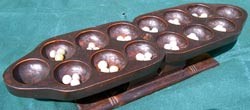Resource 4: The cultural game of Africa
![]() Pupil use
Pupil use
This game has many names, for example:
- Kpo by Vai people of Sierra Leone and Liberia
- Ajua by Luo in Kenya
- Omweso by Ganda of Uganda
- Bao by Swahili in East Africa
- Gambatta in Ethiopia
- Ayo by Yoruba in Nigeria
- Oware by Igbo in Nigeria
- Warri by Asante in Ghana
How to play Oware
The Oware board
The boards for playing the game are made of either beautifully carved wood, bronze (in the royal court of Benin, Nigeria) or gold (by the Asante Kings in Ghana). The board is divided into two areas, with six holes in each, so 12 holes in total. There are two extra holes, not part of the board proper, for holding each player's captives. One of the players has the area of six holes in the top row and the other player has the area of six holes in the bottom row.
The aim of Oware
To take more stones than your opponent. At the end of the game, the player who has taken the most stones wins.

How to play Oware
Start the game by putting four stones in each of the 12 holes.
Now decide who goes first.
The first player takes all the stones from one of his or her holes and moves them anticlockwise, putting one stone in each hole.
If the last stone you put is in one of your opponent’s holes, and that hole only has one or two stones in it, (so, two or three after you have put your stone in it) you take all the stones from that hole, and leave the hole empty.
If the hole before also has only one or two stones (so, two or three stones after you place your stones), you take that hole too, and so on.
You can only take holes in the area of your opponent.
If you have taken more than 11 stones from the starting hole, then that hole is always left empty.
You are not allowed to stop feeding the holes in your opponent’s area.
The game ends if a player hasn’t got any stones left in his/her area, and therefore can’t play.
In this case, the other player takes all the remaining stones.
Now count your stones – whoever has the most is the winner!
Adapted from: Web Facil, Itnet, Website
Giuthi Proverb
‘You can't steal the cattle of another man without entering his land!’
Resource 3: Table to record numeracy skills



